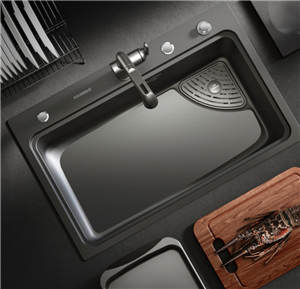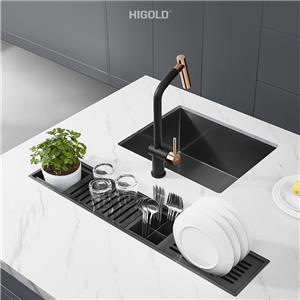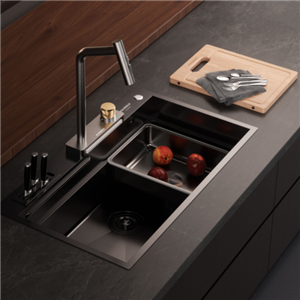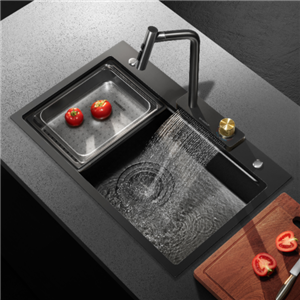Is it safe to pour boiling water into the kitchen sink?
As one of the busiest spaces in a family's daily life, the sink is undoubtedly one of the most important facilities. The sink is responsible for washing food, tableware, utensils, and treating sewage, and is an indispensable part of a family's daily life. At the same time, many people often face some common problems and concerns when using the kitchen sink, such as whether the kitchen sink can withstand the impact of boiling water, or whether pouring boiling water into the sink will cause damage? Although these issues seem simple, they involve many aspects such as the material, structure, heat resistance, and usage habits of the kitchen sink, which are worthy of consumers' in-depth understanding and thinking.
In daily life, many people habitually pour boiling water directly into the sink for cleaning, especially when washing greasy tableware or food, boiling water can often quickly remove grease and achieve a cleaning effect. However, is it really safe and appropriate to pour boiling water into the sink? Will this practice cause potential damage to the sink? If there is a risk, how to avoid it? This article will explore this topic in depth and provide consumers with valuable suggestions.
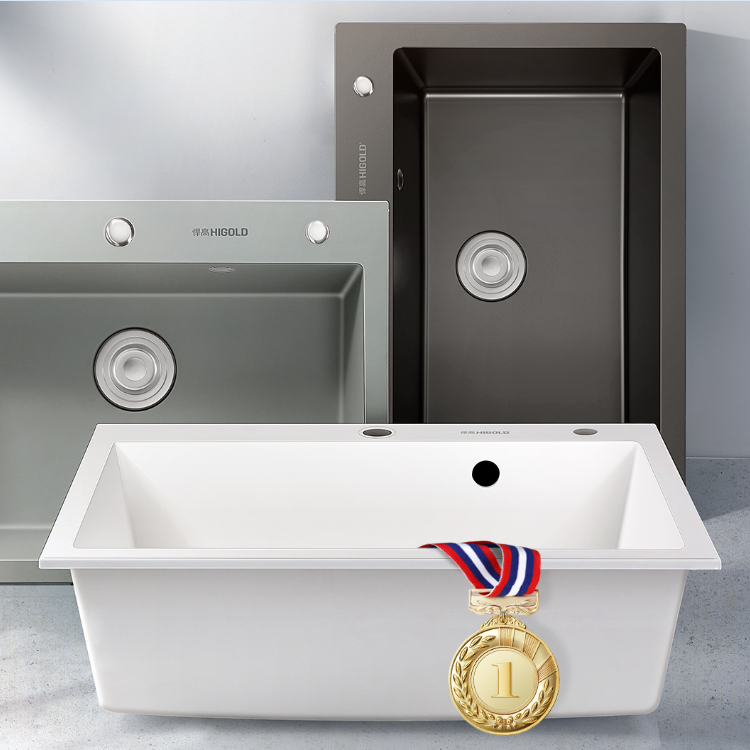
Materials and heat resistance of kitchen sinks
To answer the question "Is it safe to pour boiling water into the kitchen sink?", we first need to understand the main materials of kitchen sinks and the heat resistance of these materials. According to different needs in the market, kitchen sinks are available in a variety of materials, among which the most common materials are stainless steel, ceramics, composite materials, quartz stone, etc. Sinks of different materials have different heat resistance and react differently to boiling water.
1. Stainless steel sinks
Stainless steel sinks are the most common type of sinks on the market. It has the advantages of corrosion resistance, high temperature resistance, and impact resistance, and is suitable for various kitchen environments. Stainless steel sinks have strong heat resistance and can generally withstand temperatures exceeding 100 degrees Celsius. Therefore, pouring a moderate amount of boiling water into a stainless steel sink usually does not cause damage. However, it is worth noting that although stainless steel sinks have strong heat resistance, if boiling water is poured into the sink for a long time, or high-temperature operations are repeated many times, it may cause slight thermal expansion and contraction on the surface of the sink, thereby affecting its stability in long-term use.
2. Ceramic sinks
Ceramic sinks are popular among consumers for their smooth, elegant appearance and excellent stain resistance. Although ceramic sinks have good heat resistance, they have poor impact resistance compared to stainless steel. If boiling water is poured into a ceramic sink, especially when a large amount of boiling water is poured quickly in a short period of time, it may cause cracks or bursts on the surface of the sink, especially when the sink material has minor defects or aging. Therefore, when using a ceramic sink, avoid long-term contact with boiling water, especially avoid pouring boiling water into the same place.
3. Composite sinks
Composite sinks are made of composite materials such as quartz and resin, and have strong durability, corrosion resistance and good stain resistance. Composite sinks are generally more heat-resistant and can withstand moderate hot water, but they are still more fragile than stainless steel sinks. Rapid changes in excessive temperature may cause microcracks on the surface of composite sinks, especially when there are other external forces, the impact resistance of the sink may be insufficient. Therefore, although composite sinks can withstand boiling water at a certain temperature, it is not recommended to pour boiling water frequently.
4. Quartz sinks
Quartz sinks are becoming increasingly popular in high-end kitchens because of their beauty, high-grade quality, durability, and ease of cleaning. Quartz sinks are generally heat-resistant and can withstand high-temperature water flows and can even tolerate contact with boiling water. However, the heat resistance of quartz sinks is not unlimited, and sudden and drastic temperature changes may still cause cracks or breakage in the sink. Therefore, caution should be exercised when pouring boiling water into a quartz sink.
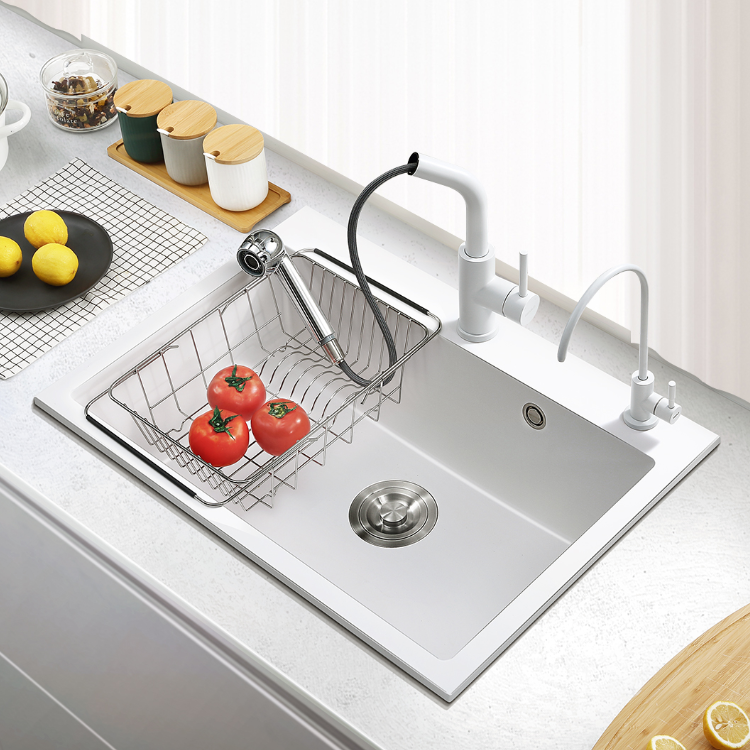
What is the effect of boiling water on kitchen sinks?
Although the heat resistance of various kitchen sinks is different, no matter what material it is, frequently pouring boiling water into the sink will have a certain impact on the sink and may even cause damage to the sink. We can analyze the possible effects of boiling water on the sink from the following aspects:
1. Thermal expansion and thermal contraction
Thermal expansion and thermal contraction are one of the main causes of sink damage. When boiling water enters the sink, the surface of the sink expands due to heat. When the temperature in the sink drops rapidly, the surface of the sink shrinks due to cooling. This repeated change of expansion and contraction can cause micro cracks on the surface of the sink, and even cause the surface coating to fall off. Under long-term thermal shock, this expansion and contraction effect may cause deformation, cracks or surface cracking of the sink.
2. Material brittleness
Sinks of different materials show different brittleness when subjected to boiling water shock. For example, ceramic sinks are prone to cracking or bursting when subjected to drastic temperature changes due to the brittleness of their own materials. Even composite sinks may cause surface deformation, cracking or local damage if subjected to boiling water shock for a long time. Especially when there are tiny flaws on the surface of the sink or it is hit at high temperature, the risk of cracks will be higher.
3. Damaged surface coating
Many stainless steel and composite sinks are coated with a rust-proof or protective layer during the manufacturing process. These coatings can enhance the corrosion resistance and durability of the sink. However, the high temperature of boiling water may damage these coatings, resulting in damage to the surface protective film. Once the coating is broken, the sink will be exposed to the air and more prone to oxidation or corrosion, which will affect its service life.
4. Sink surface stains increase
The high temperature of boiling water may not only cause damage to the sink surface coating, but also accelerate the adhesion of stains. In some kitchen sinks, scale, oil and other substances often accumulate. When boiling water is poured into the sink, it may aggravate the adhesion of stains on the sink surface, making cleaning more difficult. Especially when there are scratches or micro-cracks on the sink surface, stains will more easily enter these cracks, further damaging the sink surface.
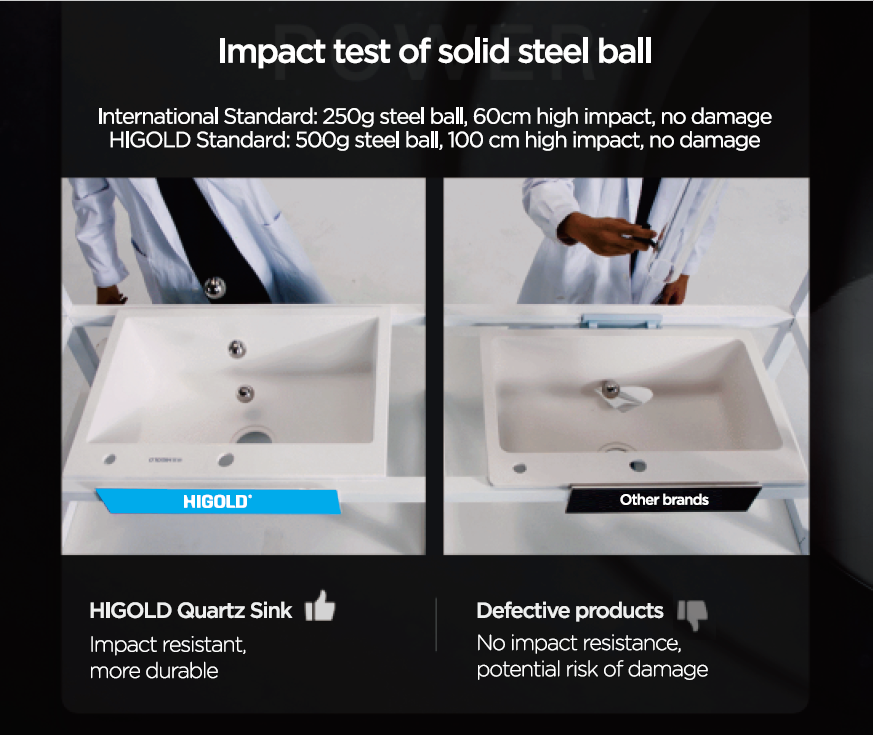
How to safely pour boiling water into the kitchen sink?
Although boiling water may have a certain impact on the sink, pouring boiling water into the kitchen sink does not necessarily cause serious damage immediately if used reasonably. In order to minimize the damage of boiling water to the sink, we can take the following safety operation suggestions:
1. Control the temperature and impact speed of boiling water
When pouring boiling water into the sink, avoid pouring a large amount of boiling water at one time, especially when the temperature difference is large. The boiling water can be properly cooled to about 80℃ before pouring it into the sink to reduce the damage caused by temperature changes. In addition, avoid pouring boiling water into the same place. It is best to evenly distribute the boiling water in the sink to reduce the impact of rapid temperature changes on the sink.
2. Use warm water instead of boiling water when appropriate
For the needs of washing greasy dishes or removing stains, warm water can also achieve better results. Try to avoid pouring boiling water into the sink for a long time. Instead, use a milder water temperature, which can not only clean the dishes, but also will not cause excessive thermal shock to the sink.
3. Check the surface condition of the sink regularly
Check the surface condition of the sink regularly, especially after using a large amount of boiling water, and find any cracks, scratches or peeling of the coating in time. Take repair measures in time when problems are found to avoid further damage.
4. Choose a sink material with strong heat resistance
When purchasing a sink, choose a material with good high temperature resistance and thermal shock resistance, such as a stainless steel sink or a quartz sink. These materials can better withstand the impact of boiling water and reduce damage caused by high temperature.
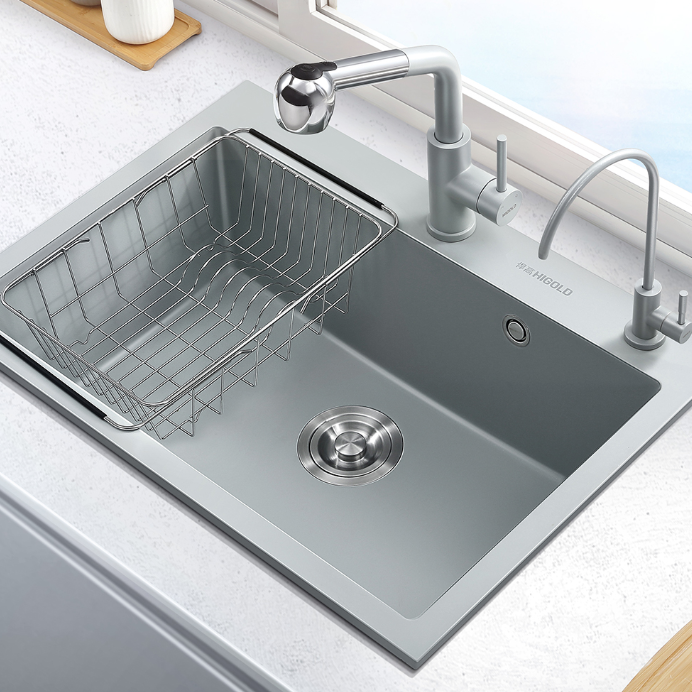
Quality Kitchen Hardware: Buy from Higold Group
Higold Group is a leading kitchen hardware manufacturer specializing in high-quality stainless steel Inox sinks and kitchen faucets. With a focus on innovation, we offer over 20 new products each year and have over 500 patents to our name. We are committed to offering competitive prices for both large-scale orders and small purchases. Whether you are buying for retail or wholesale, Higold guarantees high-quality products and timely delivery. Contact us for a quote today and take advantage of our ongoing promotions.

